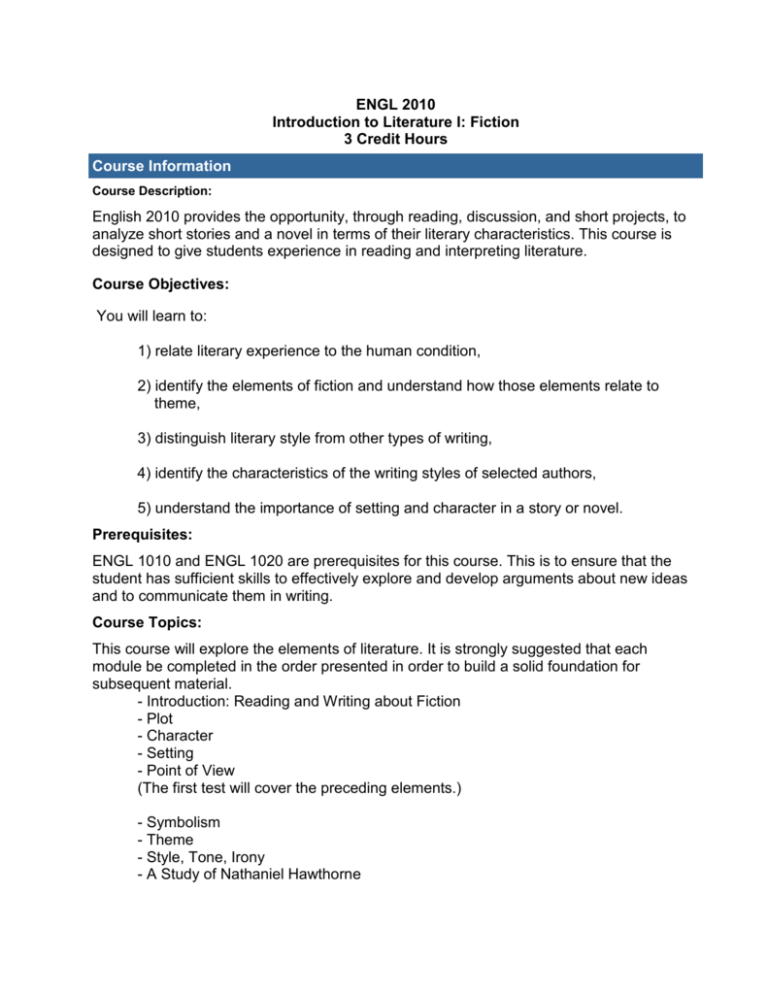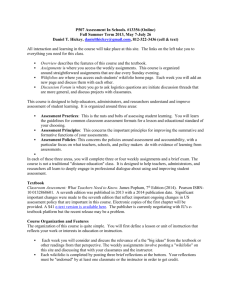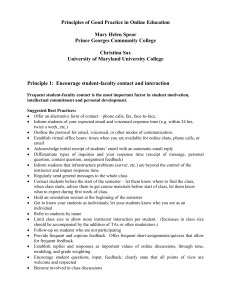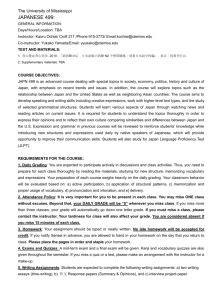ENGL 2010 - Regents Online
advertisement

ENGL 2010 Introduction to Literature I: Fiction 3 Credit Hours Course Information Course Description: English 2010 provides the opportunity, through reading, discussion, and short projects, to analyze short stories and a novel in terms of their literary characteristics. This course is designed to give students experience in reading and interpreting literature. Course Objectives: You will learn to: 1) relate literary experience to the human condition, 2) identify the elements of fiction and understand how those elements relate to theme, 3) distinguish literary style from other types of writing, 4) identify the characteristics of the writing styles of selected authors, 5) understand the importance of setting and character in a story or novel. Prerequisites: ENGL 1010 and ENGL 1020 are prerequisites for this course. This is to ensure that the student has sufficient skills to effectively explore and develop arguments about new ideas and to communicate them in writing. Course Topics: This course will explore the elements of literature. It is strongly suggested that each module be completed in the order presented in order to build a solid foundation for subsequent material. - Introduction: Reading and Writing about Fiction - Plot - Character - Setting - Point of View (The first test will cover the preceding elements.) - Symbolism - Theme - Style, Tone, Irony - A Study of Nathaniel Hawthorne - A Study of Flannery O'Connor (The second test will cover the preceding elements.) - Putting the elements of fiction together - Applying the elements of fiction to the novel form (The final test will cover the preceding elements.) Specific Course Requirements: There are no specific special course requirements necessary for successful completion of the course other than a working knowledge of how to operate in the D2L environment. Textbooks, Supplementary Materials, Hardware and Software Requirements Required Textbooks: Visit the RODP Virtual Bookstore for textbook information. You should have ready access to a college-level dictionary and a current grammar handbook with MLA format included for reference (no specific one is required) Supplementary Materials: There are no other materials required for this course. Hardware Requirements: The minimum requirements can be found at http://www.tn.regentsdegrees.org/students/hardware_software.htm. There are no additional hardware requirements for this course. Software Requirements: The minimum requirements can be found at http://www.tn.regentsdegrees.org/students/hardware_software.htm. There are no additional software requirements for this course. Instructor Information Please see the separate page inside the course to find instructor contact information. Barring unforeseen circumstances, all communication with the instructor will be acknowledged within 36-48 hours. Anticipated exceptions to this will be posted in advance on the Discussion board. Assessment and Grading Testing Procedures: All quizzes, assignments, and tests will be available through the D2L interface. No proctors are needed for the quizzes or tests; however, the Respondus LockDown Browser will be required to take all quizzes and tests in this class. For more information on the Respondus LockDown Browser and instructions for downloading, click here: Respondus LockDown Browser Student Guide To download the Browser, click here: Respondus LockDown Browser The quizzes should be taken in the week that they are assigned. They are made available to you early in the course and should be completed by the specific deadline dates (see the Calendar for specific due dates). Note: you will only be able to submit answers to the quizzes once. The tests have limited access. They have a time limit and a limited availability window. Students will be on their honor to complete the test without the use of notes, texts, and/or internet sites. Once the student begins the test, a maximum of two hours will be available to complete it. There will be at least a 48 hour window in which each test will be available. These windows will be clearly posted in the Calendar section of the course. Grading Procedure: All graded coursework will be returned within two weeks of the due date. The grade for this course will be based on several types of assessment tools. Frequent reading quizzes will be used to ensure the student understands the material presented in the text and online materials. These quizzes will include objective questions (matching, multiple choice) and short answer response questions. Periodic assignments will allow the student to explore the significance of the various elements of fiction as they apply to various works read in the course. Each assignment has a specific grading rubric included. Three tests will measure the student's ability to identify the elements of fiction and distinguish literary style as it pertains to selected authors. Tests will contain a combination of objective questions (matching, multiple choice), short answer response questions, and brief essay response questions. Two fully developed papers will explore the student's experience of the ideas in the works read in class and place them in context in the student's real world environment. Each essay will be graded using the Literature Essay Grading Rubric. Specific requirements will be discussed in the individual assignments. NOTE: Plagiarism, which involves using someone else's words, ideas, or opinions without giving proper credit or documentation, will result in receiving a grade of zero for the assignment. Intentional attempts to "pass off" someone else's work (even a paper purchased from someone else) will result in failing the course. Turnitin.com will be used to check for plagiarism on all papers and assignments. The student will also participate in a discussion forum to share perspectives with classmates. Discussion questions will be provided as a starting point, but any element of the week's reading material is also acceptable discussion material. The student is expected to participate in ALL 10 discussions. The student's participation will be graded on BOTH frequency of participation and quality of input. The response to the discussion prompt and responses to other students may receive up to 10 points for each topic, for a total of 100 points possible for the whole semester. These assessment tools will be weighted as follows: Reading quizzes 8 total - 10 points each Periodic assignments Discussion Participation 10 total Tests Papers 2 total: 35 points each 10 points each 3 total - 150 points each 2 total - 150 points each Total Points Possible 80 points 70 points 100 points 450 points 300 points 1000 points Grading Scale: 900-1000 points = A/excellent performance 800-899 points = B/very good performance 700-799 points = C/good to acceptable performance 600-699 points = D/below average performance less than 600 points = F/failing performance Assignments and Participation Assignments and Projects: Details of each Module are included on the specific pages in the Course Content section of the course. Module 1: Read Chapter 3 in the text Read "The Cask of Amontillado" (in "Stories for Further Reading" - Chap. 17) Study the Vocabulary List Complete the Module 1 Quiz Participate in the weekly discussion Module 2: Read Chapter 4 in the text Read "Girl" in the text (in "Stories for Further Reading" - Chap. 17) Study the Vocabulary List Complete the Module 2 "Character" Assignment Participate in the weekly discussion Module 3: Read Chapter 5 in the text. Read "A & P" in the text (in "Stories for Further Reading" - Chap. 17) Study Vocabulary List Complete the Module 3 Quiz Begin writing process on Paper #1 Participate in the weekly discussion Module 4: Read Chapter 6 in the text Study Vocabulary List Complete the Module 4 Quiz Participate in the weekly discussion Complete Test #1 Begin Writing Process for Paper #1. Module 5: Read Chapter 7 in the text Read "Clothes" in the text (in "Stories for Further Reading" - Chapt. 17) Study Vocabulary List Complete the Module 5 "Symbolism" Assignment Participate in the weekly discussion Module 6: Read Chapter 8 in the text Read "By-and-By" in the text (in "An Album of Contemporary Stories" - Chap. 16) Study Vocabulary List Complete the Module 6 Quiz Participate in the weekly discussion Submit Paper #1 for grading Module 7: Read Chapter 9 in the text Read "Carnal Knowledge" in the text (in "A Thematic Case Study: Humor and Satire" Chap. 15) Study Vocabulary List Complete the Module 7 Quiz Participate in the weekly discussion Begin writing process on Paper #2 Module 8: Read Chapter 12 in the text Complete the Module 8 Quiz Participate in the weekly discussion Complete Test #2 Module 9: Read "The Happy Memories Club" in the text (in "A Thematic Case Study: Humor and Satire" - Chap. 15) Read "Her First Elk" in the text (in "An Album of Contemporary Stories" - Chap. 16) Continue reading your selected and approved novel Complete the Module 9 Quiz Participate in the weekly discussion Submit Paper #2 for grading Module 10: Read "The Last Days of Muhammad Atta" in the text (in "An Album of Contemporary Stories" - Chap. 16) Read "How to Tell a True War Story" in the text (in "Stories for Further Reading" - Chap. 17) Continue reading your selected and approved novel Complete the Module 10 Quiz Participate in the weekly discussion Complete Test #3 Class Participation: Your participation in this course is a vital part of the learning environment. Participation includes more than just reading the assignments and completing the quizzes, papers, and tests. You need to use all of the resources available to you. The discussion board is available to you to engage in class-wide explorations of your responses to the readings and the stories. If you don't understand something, post a question to the main discussion board. In all likelihood someone else in the course will be able to help you understand what you may not be able to figure out on your own. The weekly discussion questions are NOT optional. You should respond to the prompt in the assignment and read other students' responses as well. I also encourage you to reply to each other's postings. A large part of learning is sharing ideas. I will monitor and provide feedback to postings as well as add probing questions that are suggested by your own responses. In addition, the email system is available to communicate with the instructor. The instructor is a resource for you to use, too. The main discussion board will also be used to post general information applicable to the class as a whole, so you should check it frequently. Punctuality: Each week of the course has specific elements that need to be accomplished in that week. Each week's assignment builds on the material in previous weeks. Therefore, you should work on the material in the order given in the schedule of assignments. With the exception of the tests and papers, as long as you complete the material for each module in the week it is due, there are no specific days or times that you need to participate. You can work on this course at a time of day best suited to your needs. The detailed due dates for the papers and tests are listed in the calendar and should be met. Assignments may be turned in early, but late work (completed after the due date noted in the calendar) will not be accepted, neither will late papers or tests. Course Ground Rules A list of basic assumptions and ground rules are noted below: • • • • • • • • Complete assignments in the order and week assigned. Participate in weekly discussions in addition to completing the reading, quizzes, assignments, and papers. Actively communicate with other students. Learn how to navigate in D2L. Keep abreast of course announcements that will be posted on the main discussion board. Communicate within the course as opposed to using a personal e-mail address. Address technical problems immediately. Observe course netiquette at all times. Guidelines for Communications Email: • • • • Always include a subject line. Remember, without facial expressions some comments may be taken the wrong way. Be careful in wording your emails. Use standard fonts. Do not send large attachments without permission. • Respect the privacy of other class members. Discussions: Review the discussion threads thoroughly before entering the discussion. • • • • Try to maintain threads by using the "Reply" button rather starting a new topic. Do not make insulting or inflammatory statements to other members of the discussion group. Be respectful of other’s ideas. Be patient and read the comments of other group members thoroughly before entering your remarks. Respond in a thoughtful and timely manner. Web Resources: • • • Citation Styles Online http://www.bedfordstmartins.com/online/cite5.html The MLA 2009 update can be found here General writing resources from Purdue's Online Writing Center Library The Tennessee Virtual Library is available to all students enrolled in the Regents Degree Program. Links to library materials (such as electronic journals, databases, interlibrary loans, digital reserves, dictionaries, encyclopedias, maps, and librarian support) and Internet resources needed by learners to complete online assignments and as background reading are included within the assignments. Students With Disabilities Qualified students with disabilities will be provided reasonable and necessary academic accommodations if determined eligible by the appropriate disability services staff at their home institution. Prior to granting disability accommodations in this course, the instructor must receive written verification of a student's eligibility for specific accommodations from the disability services staff at the home institution. It is the student's responsibility to initiate contact with her/his home institution's disability services staff and to follow the established procedures for having the accommodation notice sent to the instructor. Syllabus Changes The instructor reserves the right to make changes as necessary to this syllabus. If changes are necessitated during the term of the course, the instructor will immediately notify students of such changes both by individual email communication and posting both notification and nature of change(s) on the course bulletin board. Technical Support Telephone Support: If you are having problems logging into your course, timing out of your course, using your course web site tools, or other technical problems, please contact the RODP Help Desk by calling 866-550-7637 or you can visit the website: RODP Tech Support Website If you contact the RODP Help Desk by phone please be at your computer and be prepared to provide the following information: • • • • • • • • Your username Your password The URL (address, "http://...") you are unable to access Your instructor's name Your course number, section and name (Example: BIT1110R50 Intro to Microcomputers) Are you using a PC or Macintosh Your operating system (Windows 98, NT, 2000, etc.) Browser type and version (Example: Internet Explorer 5.5) If you have a question about: • • • • • academic issues student orientation registration for classes receiving your user id and password institutional record-keeping and research Please contact your RODP Campus Contact Representative If you have a complaint or grievance: Please contact your RODP Campus Contact Representative






